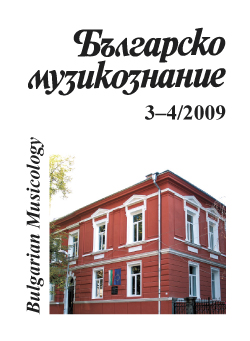Аспекти на съвременната терминология и актуалната програма по музика в българското общообразователно училище
Aspects of Modern terminology and the Current Music Program in the Bulgarian Schools of General Educational
Author(s): Rossitsa DraganovaSubject(s): Music
Published by: Институт за изследване на изкуствата, Българска академия на науките
Summary/Abstract: The problems associated with the contemporary terminology and the music program, outline a specific scope for analysis. Current, for music-pedagogical practice, are the terms set in the music program itself for a class or educational level. This program, in its turn, is developing in conjunction with a cognitive model, in the parameters of which is described and interpreted a musical phenomenon. Subject of author’s analysis is how the modern terminology affects music-pedagogical practice. Isolated are two main ways: direct, by defining the basic ideas and concepts, and indirect by forming a model of music, which serves as a basis for development the programs of the schools of general education. The approaches used in the general education practice are changing mostly indirectly as a result of the changes that have taken place in the thinking about music. Commented is the current terminological system, set in the program for each educational level, in conjunction with the model for music, which it implicitly represents. Also a categorization of basic and complementary terminology in the music program for the elementary school has been made explaining: concepts for pitch and modes; duration and metrum (time signature), rhythm, tempo, dynamics, elements of musical expressiveness and character of the musical imagery; knowledge about musical instruments, voice ranges and various ensembles; concepts of form construction; concepts and ideas, coupled with versatile functions of music (musical genres, knowledge of the specific role of the composer, artist, audience); knowledge of notes and notation; Bulgarian folk customs and traditions and folklore traditions of other ethnic groups.
Journal: Българско музикознание
- Issue Year: 2009
- Issue No: 3-4
- Page Range: 186-193
- Page Count: 8
- Language: Bulgarian
- Content File-PDF

